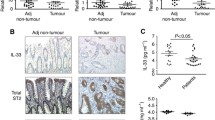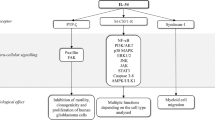Abstract
The effect of aspirin on colon-cancer-cell-induced cytokine secretion by peripheral blood mononuclear cells (PBMC) was examined. Aspirin was added to human colon cancer cells (HT-29 and RKO) or to PBMC incubated separately or jointly. The secretion of IFNγ, IL-6, and IL-10 induced by HT-29 cells was decreased, that of IL-1β was slightly increased, whereas IL-1ra production was not affected. With RKO cells, aspirin reduced IL-6, IL-1ra, and IL-10 synthesis and enhanced IFNγ secretion, while IL-1β remained unchanged. Conditioned media from colon cancer cells incubated without or with aspirin stimulated cytokine productions by PBMC similarly, suggesting that aspirin acts on the cell-to-cell interaction between cancer cells and PBMC. The results indicate that aspirin alter the balance between pro- and anti-inflammatory cytokines generated by interaction between colon cancer and immune cells disclosing an additional role of the drug in affecting inflammation-induced colon cancer.
Similar content being viewed by others
References
Waldner, M.J., and M.F. Neurath. 2009. Colitis-associated cancer: The role of T cells in tumor development. Seminars in Immunopathology 31: 249–256.
Cambell, F.C., and R.J. Maxwell. 2009. Rationale for cancer prevention strategies in high-risk ulcerative colitis. Surgeon 7: 96–100.
Zhao, Y.J., and Y.Z. Yuan. 2009. Clinical study of the relationship between inflammatory bowel diseases and colorectal neoplasms. Journal of Digestive Diseases 10: 113–117.
O’Byrne, K.J., A.G. Dalgleish, M.J. Browning, W.P. Steward, and A.L. Harris. 2000. The relationship between angiogenesis and the immune response in carcinogenesis and the progression of malignant disease. European Journal of Cancer 36: 151–169.
van Staa, T.P., T. Card, R.F. Logan, and H.G. Leufkens. 2005. 5-aminosalicylate use and colorectal cancer risk in inflammatory bowel disease: A large epidemiological study. Gut 54: 1573–1578.
Das, D., N. Arber, and J.A. Jankowski. 2007. Chemoprevention of colorectal cancer. Digestion 76: 51–67.
Herszényi, L., F. Farinat, P. Miheller, and Z. Tulassay. 2008. Chemoprevention of colorectal cancer: Feasibility in everyday practice? European Journal of Cancer Prevention 17: 502–514.
Cuzick, J., F. Otto, J.A. Baron, P.H. Brown, J. Burn, P. Greenwald, J. Jankowski, C. La Vecchia, F. Meyskens, H.J. Senn, and M. Thun. 2009. Aspirin and non-steroidal anti-inflammatory drugs for cancer prevention: An international consensus statement. Lancet Oncology 10: 501–507.
Sotiriou, C., M. Lacroix, L. Lagneaux, G. Berchem, and J.J. Body. 1999. The aspirin metabolite salicylate inhibits breast cancer cells growth and their synthesis of the osteolytic cytokines interleukins -6 and-11. Anticancer Research 19: 2997–3006.
Nakamura, A., T. Kohsaka, D. Jin, and N. Kobayashi. 1992. Influence of glucocorticoid, aspirin, and gamma globulin on interleukin-6 production in the hepatoma cell lines. Immunopharmacology 24: 31–36.
Slattery, M.L., K. Curtin, R. Baumgartner, C. Sweeney, T. Byers, A.R. Giuliano, K.B. Baumgartner, and R.R. Wolff. 2007. IL-6, aspirin, nonsteroidal ant-inflammatory drugs, and breast cancer risk in women living in the southwestern United States. Cancer Epidemiology, Biomarkers & Prevention 16: 747–755.
Slattery, M.L., R.K. Wolff, J.S. Herrick, B.J. Caan, and J.D. Potte. 2007. IL-6 genotypes and colon and rectal cancer. Cancer Causes and Control 18: 1095–1105.
Kutuk, O., and H. Basaga. 2004. Aspirin inhibits TNFalpha-and IL-1 induced NF-kappa B activation and sensitizes HeLa cells to apoptosis. Cytokine 25: 229–237.
Zhu, G.H., and E.L. Schwartz. 2003. Expression of the angiogenic factor thymidine phosphorylase in THP-1 monocytes: Induction of autocrine tumor necrosis factor-alpha and inhibition by aspirin. Molecular Pharmacology 64: 1251–1258.
Lang, S., L. Lauffer, C. Clausen, I. Löhr, B. Schmidtt, D. Höltzel, B. Wollenberg, O. Gires, E. Kastenbauer, and R. Zeidler. 2003. Impaired monocytes function in cancer patients: restoration with a cyclooxygenase-2 inhibitor. FASEB Journal 17: 286–288.
Lang, S., A. Picu, T. Hofman, M. Andratschke, B. Mack, A. Moosmann, O. Gires, S. Tiwari, and R. Zeidler. 2006. COX-inhibitors relieve the immunosuppressive effect of tumor cells and improve functions of immune effectors. International Journal of Immunopathology and Pharmacology 19: 409–419.
Lin, W.W., and M. Karin. 2007. A cytokine-mediated link between innate immunity, inflammation and cancer. Journal of Clinical Investigation 17: 1175–1183.
Gout, S., and J. Huot. 2008. Role of cancer microenvironment in metastasis: Focus on colon cancer. Cancer Microenvironment 1: 69–83.
Burnett, G.T., D.C. Weathersby, T.E. Taylor, and T.A. Bremner. 2008. Regulation of inflammation-and angiogenesis-related gene expression in breast cancer cells and co-cultured macrophages. Anticancer Research 28: 2093–2098.
Lai, M.Y., J.A. Huang, Z.H. Liang, H.X. Jiang, and G.D. Tang. 2008. Mechanisms underlying aspirin-mediated growth inhibition and apoptosis induction of cyclooxygenase-2 negative colon cancer cell line SW480. World Journal of Gastroenterology 14: 4227–4233.
Doherty, G.A., and F.E. Murray. 2009. Cyclooxygenase as a target for hemoprevention in colorectal cancer: Lost cause or a concept coming of age? Expert Opinion on Therapeutic Targets 13: 209–218.
Lanas, A. 2009. Nonsteroidal anti-inflammatory drugs and cyclooxygenase inhibition in the gastrointestinal tract: A trip from peptic ulcer to colon cancer. American Journal of the Medical Sciences 338: 96–106.
Zhang, L., J. Tu, Z.L. Yu, Y.D. Wu, C.M. Xu, and S.T. Zhang. 2010. Effects of the inhibition of cyclooxygenase-2 on human esophageal cancer cells: Inhibition of cell proliferation and induction of apoptosis. Pathology Oncology Research 16: 39–45
Matsuo, Y., H. Sawai, J. Ma, D. Xu, N. Ochi, A. Yasud, H. Takahashi, H. Funahashi, and H. Takeyama. 2009. IL-1α secretion by colon cancer cells enhances angiogenesis: The relationship between IL-1α release and tumor cells’ potential for liver metastasis. Journal of Surgical Oncology 99: 361–367.
Author information
Authors and Affiliations
Corresponding author
Rights and permissions
About this article
Cite this article
Bergman, M., Djaldetti, M., Salman, H. et al. Inflammation and Colorectal Cancer: Does Aspirin Affect the Interaction between Cancer and Immune Cells?. Inflammation 34, 22–28 (2011). https://doi.org/10.1007/s10753-010-9203-6
Published:
Issue Date:
DOI: https://doi.org/10.1007/s10753-010-9203-6




